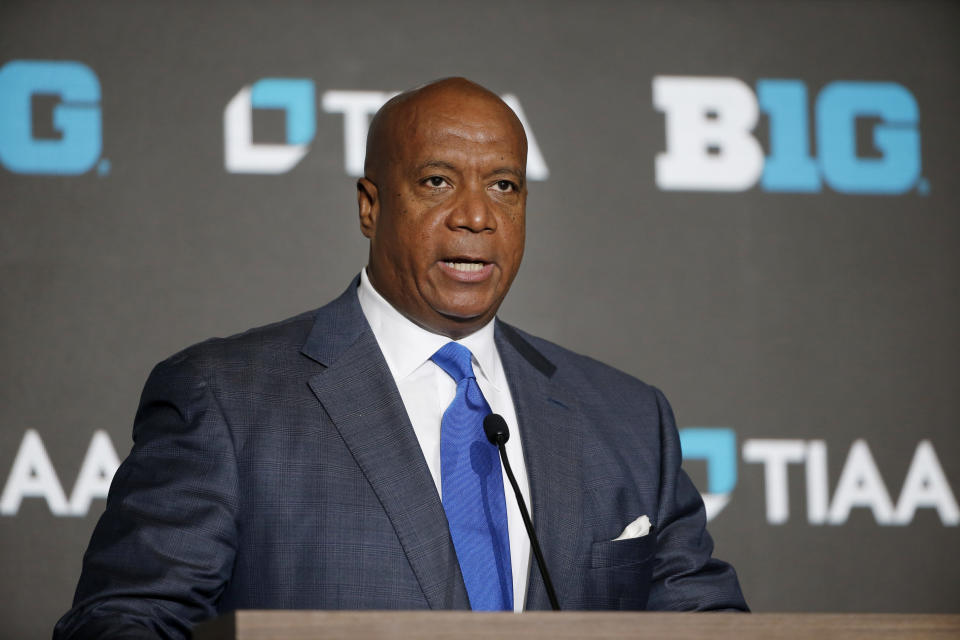On June 4, 2019 — just 3½ years ago — Kevin Warren arrived in college athletics, leaving a job as chief operating officer of the Minnesota Vikings to become commissioner of the Big Ten.
In 2020, he led a disastrous and short-lived cancellation of the Big Ten football season due to the COVID-19 pandemic. It was reversed when the SEC, ACC and Big 12 wouldn’t follow, and the league played an abridged season.
In 2021, Warren helped form “The Alliance,” a de facto governance block with the ACC and Pac-12, in response to the SEC adding Oklahoma and Texas as future members. The Alliance was supposedly troubled by conference expansion (foreshadowing alert), but its only tangible accomplishment was torpedoing an expanded playoff plan because it was designed, in part, by SEC commissioner Greg Sankey.
By 2022, The Alliance was annihilated when Warren led his own expansion raid of the Pac-12, a supposed partner. By bringing USC and UCLA to the Big Ten, Warren forever altered the fabric of both leagues and any semblance of trust across the sport.
Soon the Big Ten scored a massive media rights deal. With the league strengthened and a competitor weakened, playoff expansion went back on the table and got approved.
And now, in classic modern college sports fashion, Warren has hit the transfer portal for what is perceived to be a better opportunity (president and CEO of the Chicago Bears) because it might lead to the mother of all name, image and likeness deals — commissioner of the NFL and its $60 million-plus salary.
Left behind is, well, a lot.
The NCAA convention is currently being held in San Antonio, and the most popular buzzword from regulation-obsessed administrators is “guardrails,” or the need for some kind of rules to limit athletes from transferring or making money or who knows what. They claim that everything is a risk to the sanctity of college athletics. Mostly, it’s people who are scared of change.
The truth is, no amount of linebackers seeking playing time and the possibility of a few additional bucks can alter the fabric of college sports the way Warren did. The players are just following the actions of the boss, ruthlessly looking out for their best interests.


Now he’s gone, and everyone else can figure out what to do with the results — be they positive, negative or simply different.
Even his greatest critic has to acknowledge that Warren was decisive and divisive in ways no one saw coming. He was hired as a little-known outsider; he’d played some college basketball and worked as a lawyer on some infractions cases, but his experience was in the NFL.
Many figured he’d take time to learn the lay of the land. Instead, the now-59-year-old upended everything and then bailed at the first chance.
The botched COVID cancellation plan initially led to questions about his competence. No, it wasn’t all his idea, but it looked increasingly ridiculous as football was safely played in other parts of the country, not to mention the NFL.
Yet rather than be paralyzed by his start, Warren bulldozed through everyone. The Big Ten is now bigger and wealthier than ever. It is also different, which might or might not impact it in ways no one can predict. Two L.A. schools in a once-Midwestern league? Could be great. Might be mediocre, though. Either way, everyone got rich.
Meanwhile, the Pac-12, which foolishly trusted Warren, is trying to dust itself off and prop itself up as a smaller, and comparatively poorer, entity. The ACC simultaneously keeps falling behind monetarily due to a terrible long-term media deal. And if there is a No. 1 candidate to replace Warren in the Big Ten, it’s current ACC commissioner Jim Phillips, who used to be the athletic director at Northwestern.
The corner office transfer portal might not be finished, even if many in the corner office decry the portal for the athletes.
In college football, which pays the bills for college athletics at large, Warren placed the Big Ten firmly into a Big Two/Dueling Super Powers situation with the SEC. Everyone else is chasing behind, seeking relevance, revenue and competitive hope. He more than earned whatever the league paid him.
All the cries about tampering, money-driven transfers and more bottom-line decisions in the way rosters are created were perfected by Kevin Warren. His entire tenure was back-channel deals and broken handshakes, which isn’t a criticism, just a nod to reality. He gave up on the pretense of playing nice and simply played everyone for whatever he and his league deemed necessary.
This was business, strictly business. There were no guardrails that could contain him.
Now he’ll try to solve the Bears’ stadium issues and perhaps rebuild the franchise into an on-field winner. Eventually, he could succeed Roger Goodell as NFL commissioner.
Three-and-a-half years — not even a full traditional college career — after arriving in the college game, Warren has declared for the pros.
His impact will be lengthy, in all sorts of ways.
